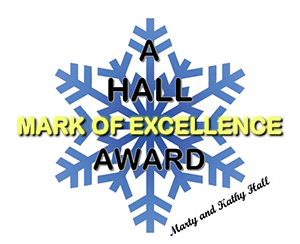 This World Cup coverage is made possible through the generous support of Marty and Kathy Hall and A Hall Mark of Excellence Award. To learn more about A Hall Mark of Excellence Award, or to learn how you can support FasterSkier’s coverage, please contact info@fasterskier.com.
This World Cup coverage is made possible through the generous support of Marty and Kathy Hall and A Hall Mark of Excellence Award. To learn more about A Hall Mark of Excellence Award, or to learn how you can support FasterSkier’s coverage, please contact info@fasterskier.com.
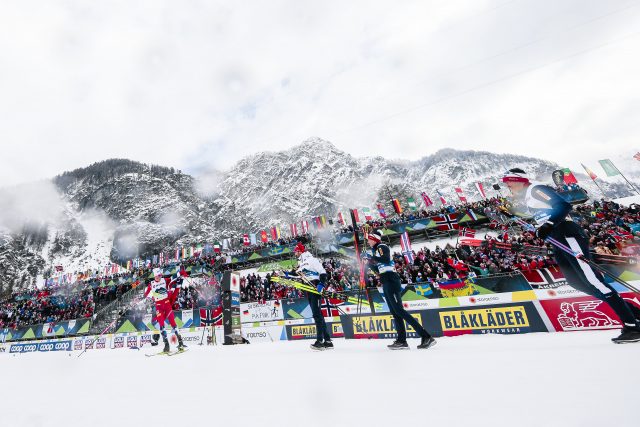
In sport, sometimes “foregone conclusions” prove to have been premature; that can make for exciting racing. At other times, foregone conclusions prove accurately prescient; that makes for situations in which the anticipation of action and drama is entirely spoiled. In Planica, Slovenia, Team Norway spoiled (predictably) the excitement of the World Championship Men’s Relay, winning gold well ahead of second place Finland and third place Germany. Foregone conclusion, indeed . . .
North American teams were well represented in the relay field, with Canada holding its position in the group of medal contenders throughout the day by virtue of fine skiing by Xavier McKeever, Graham Ritchie, Antoine Cyr, and Olivier Leveille. They would finish fifth. Team USA’s performance was highlighted by the heroic classic skiing of Ben Ogden (he led the chase group for much of Leg 1), but that advantage would be undone in Leg 2, with later skiers being left with no chance to overcome the deficit. Team USA would finish seventh.
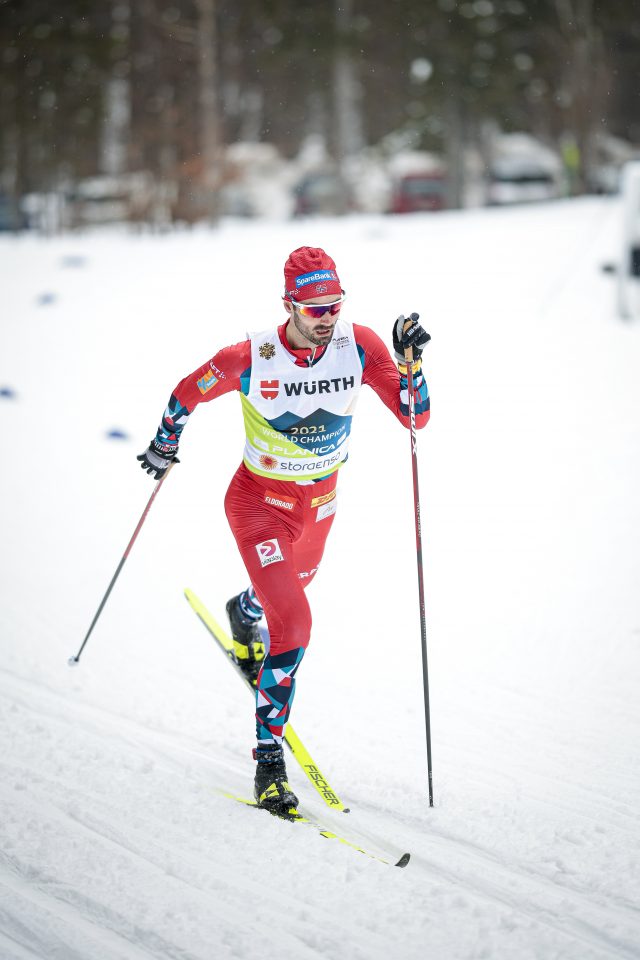
As is so often the case, the story at the front of the field was Norway . . . though even television broadcast cameras paid little attention to them. It’s not Norway’s fault that they dominate so completely; it’s not Norway’s fault that they win with such apparent ease. They appear so confident, so self-assured. But in the hours before the race, there was plenty of tension, indeed. The forecast for the day—snow then not snow, rain then not rain— elicited considerable worry among those responsible for ski preparation. If the forecasts came true, the classic legs could’ve become a horrible, unpredictable mess.
“If it rains for real, we gotta be on klister,” American, Ben Ogden, told FasterSkier’s Nat Herz. “If it snows for real, we gotta be on zeroes, and if it does this mixed [stuff], then we don’t know!”
Had the snow fallen, had the rains come, then athletic superiority (which Norway possesses in spades) potentially could’ve been undone. It’s been known to happen before . . . In the end, the threats of those earlier forecasts never materialized. The skies over Planica remained gray and temperatures remained relatively warm, but neither snow nor rain ever materialized. Skiers utilized a variety of ski prep tactics (Ogden skied on zeroes while many others chose klister); regardless, most seemed to benefit from both good glide and sufficient kick. The race didn’t come down to technological superiority . . . it remained a case of athletic superiority. Probably no one was more relieved than Norway. There was a lot more tension surrounding this event in the pre-race hours than there was during the race, itself. Once the starter’s pistol sounded, things were decided pretty quickly. Hans Christer Holund (NOR) made sure of that.
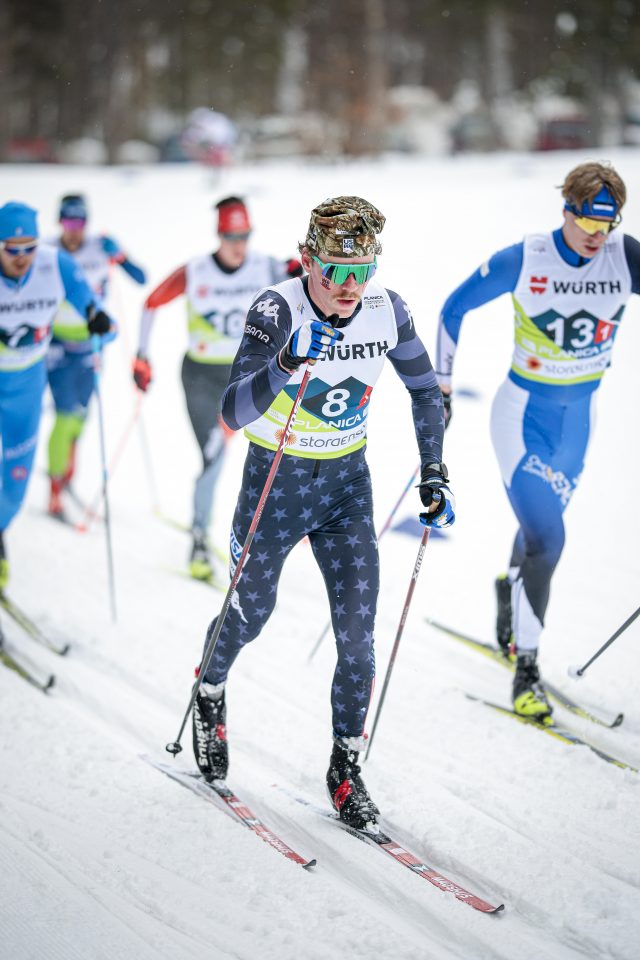
Men’s 4 x 10 k Relay
Holund got away almost immediately: Norway wouldn’t be a part of this relay story again until they crossed the finish line well ahead of all other teams. Behind Holund, though, the race played out in ways that were both predictable and surprising. Unlike yesterday’s Women’s relay in which each skier raced a single 7.5 k lap, the Men’s relay course offered each skier a pair of five-kilometer laps. Within that format, it was in the chase group where the action took place.
Ogden—jauntily sporting a camo-print US Ski Team hat, but not (visibly) wearing the normally-expected USA Team Relay socks—pushed the pace through most of the first leg. “It was a bit frantic at the beginning,” Ogden said. “The first time up the big hill, I had…a moment of ‘I could go get [Holund], but it would’ve been SO disastrous. In a 4 x 10 k, you gotta remember it’s still a distance race!”
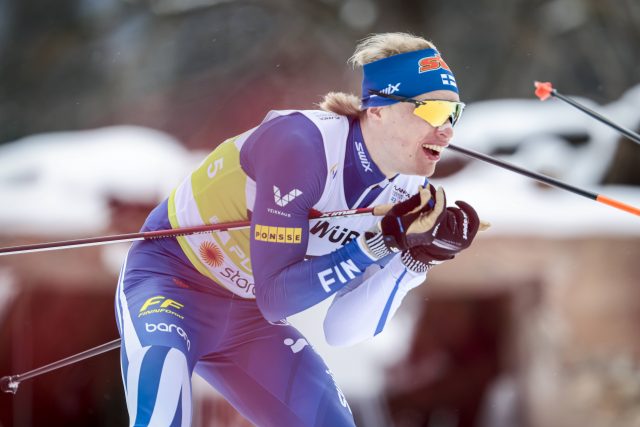
Leg 2 was marked by the emergence of classic specialist, Iivo Niskanen (FIN), whose second lap surge separated his team from the others. Niskanen quickly established a considerable gap as the chase group behind him dwindled. American, Hunter Wonders, found himself dropped from the chase group: the USA would fall from contention, and Team Finland would not be challenged for the silver medal again. Likewise, Germany found itself gapped in these middle laps, but a late-race slowing of the chase group’s pace would allow Friedrich Moch (GER) to catch back on. His brave efforts would ultimately prove crucial to Germany securing a surprising bronze medal.
Ultimately, Norway (anchored by an easy-skiing Johannes Hoesflot Klaebo who had ample time to collect a Norwegian flag in his celebratory stroll down the homestretch) would win by nearly a minute, followed by Niko Antolla of Finland in second. Germany’s courageous Moch outsprinted Jules Lapierre (FRA) for bronze.
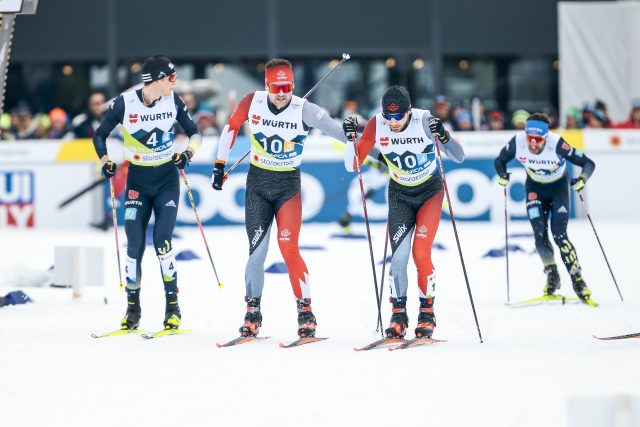
Team Canada remained in contention throughout the day—ultimately finishing fifth—boding well for the future development of this young team. “[It was] definitely a different experience,” said McKeever. “Being at the front…fighting for a medal.”
Men’s Relay RESULTS
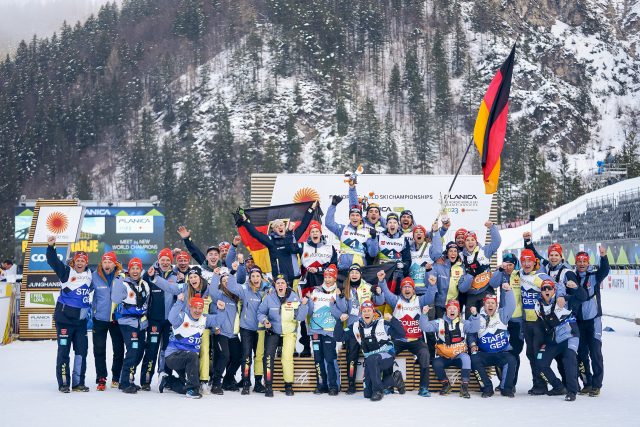
John Teaford
John Teaford—the Managing Editor of FasterSkier — has been the coach of Olympians, World Champions, and World Record Holders in six sports: Nordic skiing, speedskating, road cycling, track cycling, mountain biking, triathlon. In his long career as a writer/filmmaker, he spent many seasons as Director of Warren Miller’s annual feature film, and Producer of adventure documentary films for Discovery, ESPN, Disney, National Geographic, and NBC Sports.



